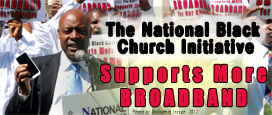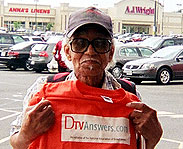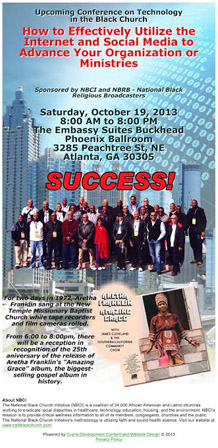Digital Divide Initiative


AFRICAN AMERICANS AND THE CRISIS OF ARTIFICIAL INTELLIGENCE (AI)
AI Is Biased Against Speakers of African American English, Study Finds
With each version of large language models like ChatGPT, developers have gotten better at filtering out racist content absorbed through sources like the internet. But researchers have discovered more subtle, covert forms of racism —such as prejudice based on how someone speaks—still lurking deep within AI.The research team, including University of Chicago Asst. Prof. Sharese King and scholars from Stanford University and the Allen Institute for AI, also found that AI models consistently assigned speakers of African American English to lower-prestige jobs and issued more convictions in hypothetical criminal cases—and more death penalties.
“If we continue to ignore the field of AI as a space where racism can emerge, then we'll continue to perpetuate the stereotypes and the harms against African Americans,” said King, the Neubauer Family Assistant Professor of Linguistics at UChicago.

Asst. Prof. Sharese King
Top 15 Challenges of Artificial Intelligence in 2025
Artificial intelligence is evolving rapidly and is emerging as a transformative force in today's technological world. It enhances decision-making processes, revolutionizes industries, and ultimately improves lives.While projections indicate that AI is likely to add a staggering $15.7 trillion to the global economy by 2030, it is clear that the technology is here to stay. But that is not all; AI also comes with challenges that demand human attention and creative problem-solving.

AI, Racial Bias In Black Education
Dr. Musa Abdullah of Emancipation Media reports on AI being used to continue racial bias against Black Americans. AI is largely based on the data that it's trained on and in many ways the opinions of the programmers who built it that data usually comes from the past and the past has a lot of historical power imbalances and societal biases and that's going to show up in the decisions and the predictions that AI systems make.Covert Racism in AI: How Language Models Are Reinforcing Outdated Stereotypes
Despite advancements in AI, new research reveals that large language models continue to perpetuate harmful racial biases, particularly against speakers of African American English.Large language model developers spend significant effort fine-tuning their models to limit racist, sexis and other problematic stereotypes. But in a new study, Stanford researchers find that these models still surface extreme racist stereotypes dating from the pre-Civil Rights era.
People have started believing that these models are getting better with every iteration, including in becoming less racist, but this study suggests that instead of steady improvement, the corporations are playing whack-a-mole - they've just gotten better at the things that they've been critiqued for.

Research Dean's Corner - Artificial Intelligence and Racial Bias
The Albany Law School Research Dean's Corner is a special periodic faculty-to-faculty discussion show hosted by Associate Dean of Research and Scholarship and Professor of Law Keith Hirokawa about current legal research and current events.Coded Bias - 2020
A documentary that looks at the dangers of artificial intelligence and its increasing omnipresence in daily life, as new research shows that it often reflects racist biases.The film begins with Joy Buolamwini, a researcher at the MIT Media Lab, discovering that most facial recognition software does not recognize darker-skinned or female faces. She goes on to uncover that artificial intelligence is not in fact a neutral scientific tool; instead, it internalizes and echoes the inequalities of wider society.
Racial Bias In AI? How Do We Respond?
Though the future is AI, it already interacts with us on a daily basis so the question becomes if we as a community do not have some level of control or influence what does that mean for our future?Imaginative constructions of intelligent machines are often premised on the presumption that mechanical reason is independent of sociocultural positioning. However, AI intelligence tends to tilt more toward the emotive proclivities of the AI creator. These AI Architects are often not from our community, and the onus can't completely be on the Architects. It's only natural that some bias will be written in the code, and so it's important that all human communities are actively involved in creating monitoring and correcting artificial intelligence.
The National Black Church Initiative States Its Position on Net Neutrality and Broadband
 NBCI believes that broadband should be universally accessible despite geographic location or income and is vigorously pushing for both Net Neutrality and universal broadband access to become realities in America.
NBCI believes that broadband should be universally accessible despite geographic location or income and is vigorously pushing for both Net Neutrality and universal broadband access to become realities in America. Rev. Anthony Evans, President of the National Black Church Initiative joined Roland Martin on the set of Washington Watch to explain how this will negatively affect your ability to watch religious programming.
National Black Church Initiative States Position on Net Neutrality and Broadband
Stopping the growth of the Digital DivideWashington, DC - The National Black Church Initiative (NBCI), a coalition of 34,000 churches across the United States, believes in the general notion of Net Neutrality. NBCI supports the idea that no one should be able to intentionally restrict the quality, content and access of information over the web based upon usage, race, income or any human division that would not make one user's access equal to another user. NBCI believes that broadband should be universally accessible despite geographic location or income and is vigorously pushing for both Net Neutrality and universal broadband access to become realities in America.
This question breaks down to race simply because the income to purchase new technologies is not readily available to minorities based upon the perpetual unemployment that engulfs the African American community. Therefore, NBCI believes that the government has a moral and constitutional obligation to make sure that high speed internet is available to these communities, there is proper web education and that these individuals are connected to the commerce of the internet. This subsequently helps everyone. If a poor African American child in a particular geographic area learns the essentials of the internet they are far more likely to become a productive member of society than those who have no access at all.

National Black Church Inititiative Successfully Distributes 3.5 Million Digital TV Converter Box Applications
NBCI educates parishioners on the digital TV transition More than 34,000 African American churches across the country helped their members make the transition to digital television (DTV), as the National Association of Broadcasters (NAB) and the National Black Church Initiative (NBCI) announced a national launch of their joint educational campaign.
More than 34,000 African American churches across the country helped their members make the transition to digital television (DTV), as the National Association of Broadcasters (NAB) and the National Black Church Initiative (NBCI) announced a national launch of their joint educational campaign.
- NBCI/NAB DTV Handbook
.pdf [172kb] Requires Adobe Acrobat
 free download
free download
Digital Divide Initiative
Press Releases
Requires Adobe Acrobat ![]() free download
free download
- NBCI Supports Ban on Cellphone Use During Flights
It Will Cause Chaos in the Sky - National Black Church Inititiative Successfully Distributes 3.5 Million Digital TV Converter Box Applications
NBCI educates parishioners on the digital TV transition
Technology and the Religious Congregation
From the The Kojo Nnamdi Show, produced by member-supported
WAMU 88.5 in Washington, DC. Tuesday, Mar. 23, 2010.
From video sermons to text-message tithing, technology is transforming the way religious congregations worship and communicate. On this edition of Tech Tuesday, Kojo looks at how faith communities are adapting to the digital age.
Guests:
Anthony Evans,
President of the National Black Church Initiative; Associate Pastor, Mt. Zion Baptist Church, Washington, DC
Martin Davis,
Director, Congregational Resource Guide, The Alban Institute
Dudley Rose,
Associate Dean for Ministry Studies, Harvard Divinity School


